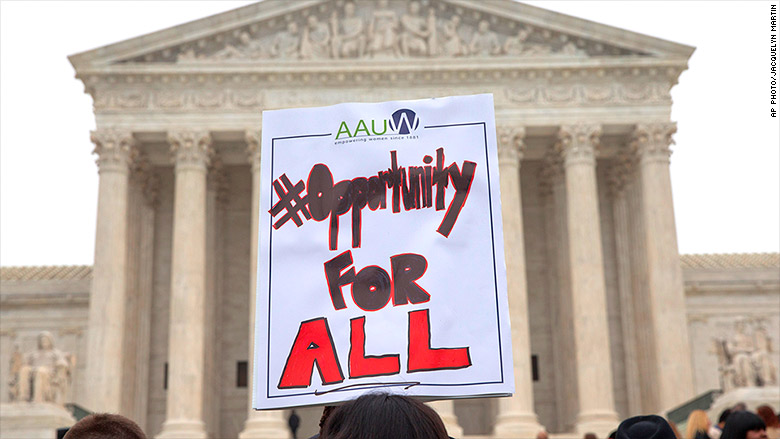
Some big companies are making the case for affirmative action as the Supreme Court hears arguments on the issue Wednesday.
Tech giants IBM and Intel, as well as chemical maker DuPont, say that colleges and universities should be allowed to consider race when admitting students as a way to increase diversity.
Why do they care? Because they, too, are struggling with diversity and believe that affirmative action policy is one part of the solution.
Affirmative action in admissions is an "essential step in any serious effort to address minority underrepresentation in the STEM fields," states a friend-of-the-court brief filed in November by IBM, (IBM) Intel, (INTC) DuPont (DD) and the National Action Council for Minorities in Engineering.
Unlike other industries, a majority of STEM (science, tech, engineering and math) jobs require a specific college degree, the companies said.
Related: I'm Muslim and I work in tech
There's been a recent push among employers to increase diversity. As of August, 24% Intel's employees were women and 12% were underrepresented minorities. But it's pledged to ramp up those numbers so that its own staff looks more like the U.S. workforce.
Other tech giants from Apple (AAPL) to Twitter (TWTR) have also began disclosing their own diversity reports. They have shown that Silicon Valley is overwhelmingly white and male -- and companies are committing to change this.
DuPont would not provide its diversity statistics and IBM did not respond to a request from CNNMoney.
Affirmative action certainly isn't the only solution to the problem, the companies said, but a "full court press" is needed to address the lack of diversity in STEM fields, the brief states.
Any decision by the Supreme Court that would keep college admissions from thinking about race would "deal a serious blow to their businesses and their efforts to remedy this critical problem," it said.
Related: Why Microsoft lost a lot of women this year
The case was brought by a white student, Abigail Fisher, who claims she was denied admission to the University of Texas at Austin in 2008 because of its affirmative action admissions policy. The U.S. Court of Appeals has upheld the university's policy not just once, but a second time after the Supreme Court asked it to reconsider in 2013.
As it stands now, most colleges are generally allowed to use affirmative action polices that consider race and ethnicity when admitting students. It cannot be the ultimate deciding factor, but it can be considered as part of a holistic review.
But eight states ban affirmative action policies in admissions at its public universities: Arizona, California, Florida, Michigan, Nebraska, New Hampshire, Oklahoma and Washington.
Some research has found that minority enrollment at the most selective public research universities does decline when a ban on affirmative action is in place. But overall minority enrollment in a state is not impacted.
There are other ways colleges try to foster diversity. Increasing need-based financial aid focuses more on recruiting low-income students rather than minorities. Some schools have dropped a requirement for applicants to submit SAT scores, which are consistently lower for Blacks and Hispanics. And some states have implemented policies that guarantee admission to public colleges for the top 10% of the graduating class at each high school.
